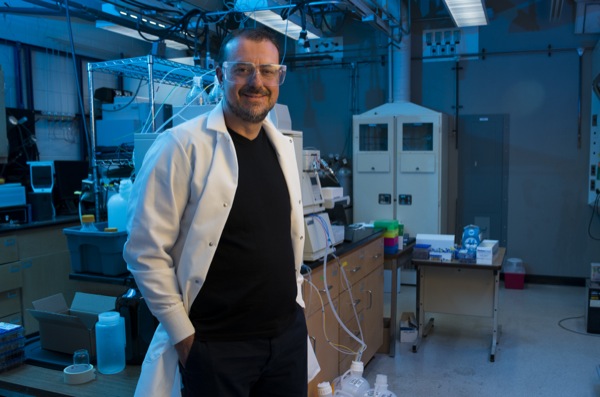CCEI teams with consumer goods, car companies in renewable plastics research
8:54 a.m., Aug. 26, 2014–The University of Delaware’s Catalysis Center for Energy Innovation (CCEI) recently announced a research program with the Plant PET Technology Collaborative (PTC) to explore methods of producing renewable beverage bottles, packaging, automotive components and fabric from biomass.
Together, CCEI and PTC are working to accelerate the development and use of 100 percent plant-based materials to produce renewable materials used in consumer products.
PTC is a strategic working group consisting of the Coca-Cola Co., Ford Motor Co., H.J. Heinz Co., Nike Inc., and the Procter and Gamble Company.
CCEI research under the PTC program will focus on converting renewable lignocellulosic (non-food) biomass, such as trees and grasses, to plastics that perform as well as those used in existing petroleum derived materials.
Researchers will concentrate on the chemical process of converting biomass to the basic chemicals that make up materials for consumer products.
“Using renewable materials to manufacture plastics provides companies flexibility in resources while also addressing the global challenge of discovering new materials for sustainable packaging,” says Dion Vlachos, CCEI director and Elizabeth Inez Kelley Professor of Chemical and Biomolecular Engineering at UD.
In particular, the research project addresses the production of plastics that offer superior properties useful in fabric, food and beverage packaging, car parts and a range of other consumer products.
The work builds on a 2012 CCEI advance that led to a new process for creating high yield (>90 percent) p-xylene from renewable biomass, which is used to produce PET plastics.
According to Paul J. Dauenhauer, associate professor of chemical engineering and materials science at the University of Minnesota and co-director of CCEI, the proposed materials created by CCEI can be mixed at any ratio with existing petroleum-derived versions, providing increased economic and manufacturing flexibility to businesses.
“You can mix our renewable materials with the petroleum-based material and the consumer will see the high level of performance as always,” he says.
The program is part of a larger effort by CCEI to create breakthrough technologies for the production of biofuels and chemicals from lignocellulosic biomass.
CCEI is a multi-institutional research center led by UD that is comprised of 20 principal investigators from nine academic institutions and one national research laboratory.
Funded by the U.S. Department of Energy as part of the Energy Frontier Research Center (EFRC) program, the center also includes an industrial consortium.
Breakthrough catalytic technologies to emerge from CCEI include a one-pot process developed in 2010 using Tin-Beta, the first heterogeneous catalyst to convert glucose into fructose and hydroxyl-methyl furfural. This is the first step in the production of a large number of targeted products including biofuels and biochemicals.
In 2013, CCEI introduced the catalytic transfer hydrogenation technology to selectively convert furans into reduced furans, such as dimethyl furan and methyl furan, and enable integration of processes from sugars to p-xylene.
Significant advances by CCEI researchers in multiscale materials synthesis and multiscale modeling have enabled other technological breakthroughs including the production of phthalic anhydride — an industrial chemical — and alkylated furans for fuel additives from furanics with greater than 80 percent yield.
For additional information, visit the website or send inquiries to ccei-director@udel.edu.
Photo by Kathy F. Atkinson

